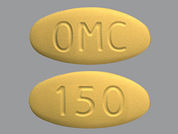Nuzyra
Omadacycline Tosylate
What is Nuzyra used for?
Omadacycline is used to treat a wide variety of bacterial infections. This medication belongs to a class of drugs known as tetracycline antibiotics. It works by stopping the growth of bacteria. This antibiotic treats only bacterial infections. It will not work for viral infections (such as common cold, flu). Using any antibiotic when it is not needed can cause it to not work for future infections.
CHEMICAL NAME
DRUG TYPE
Nuzyra Prices
Searching for the lowest prices
Nuzyra Frequently Asked Questions
Nausea, vomiting, or diarrhea may occur. If any of these effects last or get worse, tell your doctor or pharmacist promptly.
Remember that this medication has been prescribed because your doctor has judged that the benefit to you is greater than the risk of side effects. Many people using this medication do not have serious side effects.
Tell your doctor right away if you have any serious side effects, including: painful/difficult swallowing, hearing changes (such as ringing in the ears, decreased hearing), signs of kidney problems (such as change in the amount of urine, pink urine), signs of liver problems (such as loss of appetite, stomach/abdominal pain, yellowing eyes/skin, dark urine).
Omadacycline may rarely cause increased pressure around the brain (intracranial hypertension-IH). The risk of this side effect is greater for women of childbearing age who are overweight or who have had IH in the past. If IH develops, it usually goes away after omadacycline is stopped; however, there is a chance of permanent vision loss or blindness. Get medical help right away if you have: severe/lasting headache, vision changes (such as blurred/double vision, decreased vision, sudden blindness), nausea/vomiting that doesn't stop.
This medication may rarely cause a severe intestinal condition due to a bacteria called C. difficile. This condition may occur during treatment or weeks to months after treatment has stopped. Tell your doctor right away if you develop: diarrhea that doesn't stop, abdominal or stomach pain/cramping, blood/mucus in your stool.
If you have these symptoms, do not use anti-diarrhea or opioid products because they may make symptoms worse.
Use of this medication for prolonged or repeated periods may result in oral thrush or a new yeast infection. Contact your doctor if you notice white patches in your mouth, a change in vaginal discharge, or other new symptoms.
A very serious allergic reaction to this drug is rare. However, get medical help right away if you notice any symptoms of a serious allergic reaction, including: fever that doesn't go away, new or worsening lymph node swelling, rash, itching/swelling (especially of the face/tongue/throat), severe dizziness, trouble breathing.
This is not a complete list of possible side effects. If you notice other effects not listed above, contact your doctor or pharmacist.
In the US -
Call your doctor for medical advice about side effects. You may report side effects to FDA at 1-800-FDA-1088 or at MedWatch: The FDA Safety Information and Adverse Event Reporting Program.
In Canada - Call your doctor for medical advice about side effects. You may report side effects to Health Canada at 1-866-234-2345.
IMPORTANT: HOW TO USE THIS INFORMATION: This is a summary and does NOT have all possible information about this product. This information does not assure that this product is safe, effective, or appropriate for you. This information is not individual medical advice and does not substitute for the advice of your health care professional. Always ask your health care professional for complete information about this product and your specific health needs.
